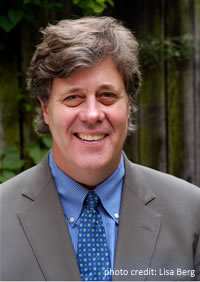For more than thirty years, David Maraniss has been a reporter for The Washington Post, winning one Pulitzer Prize for reporting and sharing in another, all while writing several bestselling and critically acclaimed non-fiction books. A witness to the technological sea changes that have engulfed traditional newspapers and, some claim, made them increasingly irrelevant, Maraniss now issues for the first time a collection of his finest newspaper stories. Into the Story: A Writer’s Journey Through Life, Politics, Sports, and Loss reminds readers why newspapers mattered in the first place.
Chapter 16: In the introduction to Into the Story: A Writer’s Journey through Life, Politics, Sports and Loss, you write, “Journalists are trained to find what is hidden, yet for most of us, when it came to the transformation, if not demise, of our own profession, the obvious became obvious only after it was obvious.” Why do you think that is?
Maraniss: I think to some degree many of us were in denial. If, like me, you grew up with ink and newsprint in your blood, if you loved the smells and sights of an old newsroom, if you believed that the highest form of journalism was deeply reported narrative, that the story was everything, that nothing transcended good clean writing, that to write you had to see and hear and feel and smell, that all good journalism depended on primary research—then much of the new technological world seemed depressing, and therefore we did not want to see what was right in front of our noses.
 Chapter 16: Harper’s Magazine recently quoted San Francisco Mayor Gavin Newsom as saying that, if the city lost both its daily newspapers, “No one under thirty would notice.” Do you agree?
Chapter 16: Harper’s Magazine recently quoted San Francisco Mayor Gavin Newsom as saying that, if the city lost both its daily newspapers, “No one under thirty would notice.” Do you agree?
Maraniss: Yes, alas. There are only a few cities in the U.S. that still have newspapers that have to be read. I love newspapers, and read many every day, but it is not just the transformation of technology that has rendered many of them unnecessary. It is also their lack of vitality and energy and depth. I think the McSweeney’s experiment in San Francisco proved that point when Dave Eggers put out one phenomenal paper.
Chapter 16: You have written a biography of Tennessean and former vice president Al Gore. What prompted you to choose for the book a piece about his early days as a newspaper reporter?
Maraniss: I chose that piece about Al Gore the journalist because I thought it was an unusual and revealing way to illuminate what drives him. He is less a politician and more a crusader.
Chapter 16: You spend months at a time researching and writing nonfiction books on your own. Yet you were also recently part of a team of reporters that won a Pulitzer Prize for coverage of the Virginia Tech shootings. Is it difficult to move between these two extremes as a writer, and how do you do it?
Maraniss: I am lucky that I get to spend most of my time on my books. But I’ve worked for The Washington Post for more than thirty-three years and love the institution, so I’ve tried to maintain some connection to it even as I move in another direction. I grew up as the son of a newspaper editor, so the rhythms of daily journalism are deep in my blood. My arrangement with the Post is that if they need me on a big story, I am there, no questions asked. That is what happened with both September 11 and Virginia Tech.
Chapter 16: Can you describe the best interview experience you have ever had?
Maraniss: I’ve had many unforgettable interviews, but the most emotional were with soldiers who survived the battle that is the central event in my Vietnam book, They Marched into Sunlight. Many of the soldiers opened up and talked about the battle for the first time in decades, and the depth of emotion that came from those interviews, from people who had seen and endured the worst that man can do to man, was extraordinary.
Chapter 16: You are currently working on a book about multiple generations of the family of President Obama. What is his level of involvement in the book?
Maraniss: I would never write an authorized biography. President Obama and his staff know that I am writing the book, and they have not put up obstacles, which is all I ask. They respect that I will write a fair biography, that I will search for the truth wherever it takes me, and that I have absolutely no axes to grind. I presume that sometime in the next few months I will conduct interviews with the president.
Chapter 16: You have met many, if not most, of the greatest figures in modern American politics and sports, but your writing about the extraordinary popularity of Muhammad Ali indicates that people feel a particular bond with him even many years after his days in the spotlight. Having spent time with him, do you have any insight as to what it is about Ali the man that evokes such strong emotion in people to this day?
Maraniss: I think Ali’s popularity transcends all ages and races because of a certain childlike quality that he exudes. He was for a decade the toughest man in the world, and he solidified his reputation as an individualist who would not yield to societal expectations or conventions, yet now he is beloved by everyone because he seems universal and nonthreatening. He makes people feel good about themselves.
Chapter 16: There is a chapter in Into the Story from your book They Marched Into Sunlight, in which you travel to Vietnam with former soldiers. What was that experience like, to sit down at a table with Vo Minh Triet and Clark Welch as the two men relived battle from opposite sides in the war?
Maraniss: There were two experiences in Vietnam that were amazing. The first was sitting at a table with the American soldier Clark Welch and his Viet Cong counterpart Vo Minh Triet and interviewing Triet about the battle in which they had tried to kill each other. There was a moment during that interview that still gives me goosebumps—when Triet rose from his chair, studied a map, put his finger directly on the spot where the battle occurred, and said, “We weren’t supposed to be there. Let me tell you how it happened … .”
The second experience was a few days later when Triet and Welch accompanied me to the battlefield. I watched in amazement as they walked almost arm in arm, pointing out various points of the battle, treating each other with the unspoken respect of two old soldiers.
Chapter 16: This is the question we ask everyone. What are you reading?
Maraniss: Aside from the shelf full of books on Kenya, Hawaii, Indonesia, Chicago, and Kansas that I’m reading for the Obama research, I just finished Life and Fate by Vasily Grossman, a new translation of a Soviet masterpiece about WWII. Also, for fun, I’m reading the book on which the movie Invictus was based.
David Maraniss will read from Into the Story: A Writer’s Journey Through Life, Politics, Sports, and Loss at McNeely Pigott & Fox in Nashville (611 Commerce St., 28th floor of Renaissance Hotel) on February 23 at 4:30 pm. A reception and book signing—with Davis-Kidd Booksellers on hand to sell books—will follow the discussion. The event is free, but please reserve your spot by emailing bookevent@mpf.com.
Tagged: Nonfiction





